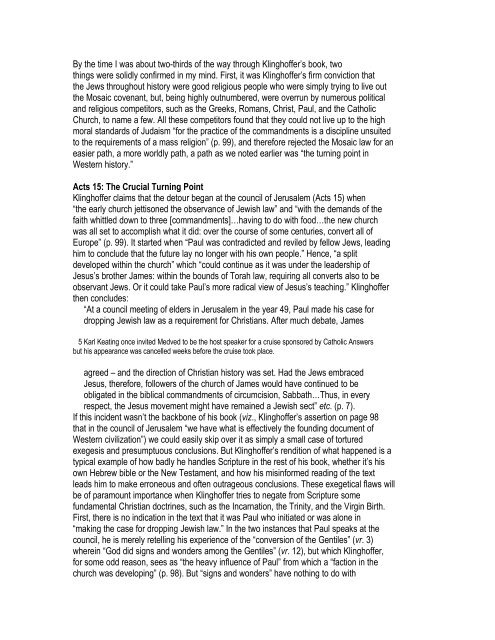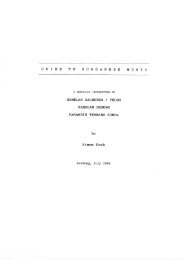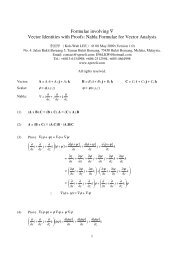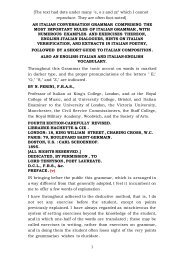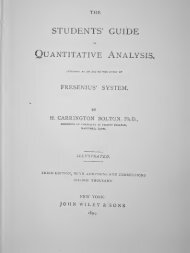Why the Jews Rejected Jesus - Free EBooks Library
Why the Jews Rejected Jesus - Free EBooks Library
Why the Jews Rejected Jesus - Free EBooks Library
You also want an ePaper? Increase the reach of your titles
YUMPU automatically turns print PDFs into web optimized ePapers that Google loves.
By <strong>the</strong> time I was about two-thirds of <strong>the</strong> way through Klinghoffer’s book, two<br />
things were solidly confirmed in my mind. First, it was Klinghoffer’s firm conviction that<br />
<strong>the</strong> <strong>Jews</strong> throughout history were good religious people who were simply trying to live out<br />
<strong>the</strong> Mosaic covenant, but, being highly outnumbered, were overrun by numerous political<br />
and religious competitors, such as <strong>the</strong> Greeks, Romans, Christ, Paul, and <strong>the</strong> Catholic<br />
Church, to name a few. All <strong>the</strong>se competitors found that <strong>the</strong>y could not live up to <strong>the</strong> high<br />
moral standards of Judaism “for <strong>the</strong> practice of <strong>the</strong> commandments is a discipline unsuited<br />
to <strong>the</strong> requirements of a mass religion” (p. 99), and <strong>the</strong>refore rejected <strong>the</strong> Mosaic law for an<br />
easier path, a more worldly path, a path as we noted earlier was “<strong>the</strong> turning point in<br />
Western history.”<br />
Acts 15: The Crucial Turning Point<br />
Klinghoffer claims that <strong>the</strong> detour began at <strong>the</strong> council of Jerusalem (Acts 15) when<br />
“<strong>the</strong> early church jettisoned <strong>the</strong> observance of Jewish law” and “with <strong>the</strong> demands of <strong>the</strong><br />
faith whittled down to three [commandments]…having to do with food…<strong>the</strong> new church<br />
was all set to accomplish what it did: over <strong>the</strong> course of some centuries, convert all of<br />
Europe” (p. 99). It started when “Paul was contradicted and reviled by fellow <strong>Jews</strong>, leading<br />
him to conclude that <strong>the</strong> future lay no longer with his own people.” Hence, “a split<br />
developed within <strong>the</strong> church” which “could continue as it was under <strong>the</strong> leadership of<br />
<strong>Jesus</strong>’s bro<strong>the</strong>r James: within <strong>the</strong> bounds of Torah law, requiring all converts also to be<br />
observant <strong>Jews</strong>. Or it could take Paul’s more radical view of <strong>Jesus</strong>’s teaching.” Klinghoffer<br />
<strong>the</strong>n concludes:<br />
“At a council meeting of elders in Jerusalem in <strong>the</strong> year 49, Paul made his case for<br />
dropping Jewish law as a requirement for Christians. After much debate, James<br />
5 Karl Keating once invited Medved to be <strong>the</strong> host speaker for a cruise sponsored by Catholic Answers<br />
but his appearance was cancelled weeks before <strong>the</strong> cruise took place.<br />
agreed – and <strong>the</strong> direction of Christian history was set. Had <strong>the</strong> <strong>Jews</strong> embraced<br />
<strong>Jesus</strong>, <strong>the</strong>refore, followers of <strong>the</strong> church of James would have continued to be<br />
obligated in <strong>the</strong> biblical commandments of circumcision, Sabbath…Thus, in every<br />
respect, <strong>the</strong> <strong>Jesus</strong> movement might have remained a Jewish sect” etc. (p. 7).<br />
If this incident wasn’t <strong>the</strong> backbone of his book (viz., Klinghoffer’s assertion on page 98<br />
that in <strong>the</strong> council of Jerusalem “we have what is effectively <strong>the</strong> founding document of<br />
Western civilization”) we could easily skip over it as simply a small case of tortured<br />
exegesis and presumptuous conclusions. But Klinghoffer’s rendition of what happened is a<br />
typical example of how badly he handles Scripture in <strong>the</strong> rest of his book, whe<strong>the</strong>r it’s his<br />
own Hebrew bible or <strong>the</strong> New Testament, and how his misinformed reading of <strong>the</strong> text<br />
leads him to make erroneous and often outrageous conclusions. These exegetical flaws will<br />
be of paramount importance when Klinghoffer tries to negate from Scripture some<br />
fundamental Christian doctrines, such as <strong>the</strong> Incarnation, <strong>the</strong> Trinity, and <strong>the</strong> Virgin Birth.<br />
First, <strong>the</strong>re is no indication in <strong>the</strong> text that it was Paul who initiated or was alone in<br />
“making <strong>the</strong> case for dropping Jewish law.” In <strong>the</strong> two instances that Paul speaks at <strong>the</strong><br />
council, he is merely retelling his experience of <strong>the</strong> “conversion of <strong>the</strong> Gentiles” (vr. 3)<br />
wherein “God did signs and wonders among <strong>the</strong> Gentiles” (vr. 12), but which Klinghoffer,<br />
for some odd reason, sees as “<strong>the</strong> heavy influence of Paul” from which a “faction in <strong>the</strong><br />
church was developing” (p. 98). But “signs and wonders” have nothing to do with


